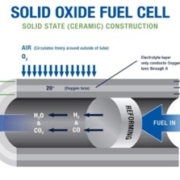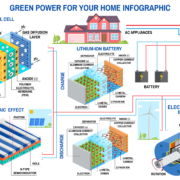Leveraging Solid Oxide Fuel Cells For A Greener Hydrogen Energy Future
In the quest for sustainable and clean energy solutions, fuel cells have emerged as a pivotal technology, holding the key to unlocking the potential of hydrogen as a versatile energy carrier. With their exceptional efficiency and minimal environmental impact, fuel cells are spearheading the transition towards a hydrogen-based energy landscape.
In this blog post, we delve into the future of hydrogen-based energy and the impact of fuel cells in paving the way for hydrogen energy production.
Why Hydrogen for Energy Production
The global pursuit of sustainable and greener energy solutions has led to an increased interest in hydrogen as a clean and versatile energy carrier. Hydrogen, when produced through renewable sources, becomes a crucial contributor to reducing carbon emissions and achieving a sustainable energy transition for several reasons.
It is a versatile energy carrier that, when used in fuel cells, produces only water and heat as byproducts. It doesn’t emit greenhouse gases or pollutants during combustion, making it a clean alternative to fossil fuels.
Hydrogen can also be stored for extended periods, which helps address the intermittent nature of renewable energy sources like solar and wind. Excess electricity generated during periods of high renewable output can be used to produce hydrogen through electrolysis and stored for later use, thus enabling a stable energy supply.
In various applications where fossil fuels are commonly used, hydrogen offers an alternative, replacing fossil fuels and reducing the carbon footprint.
Hydrogen energy solutions offer these and many other benefits, however, it’s important to note that hydrogen production is not without challenges. One major challenge is the energy-intensive nature of current hydrogen production methods, which often rely on fossil fuels. To make hydrogen truly greener, it’s crucial to produce it using renewable energy sources and improve the efficiency of production, storage, and distribution technologies. Additionally, infrastructure development, cost reduction, and policy support are necessary to realize the full potential of hydrogen in a greener energy future.
The Role of Fuel Cells in Developing Hydrogen Production
Fuel cells play a crucial role in paving the way for hydrogen energy production by providing a clean and efficient method of converting hydrogen fuel into electricity and heat. Hydrogen has the potential to be a versatile and sustainable energy carrier, and fuel cells enable its efficient utilization in various applications. Below we have highlighted aspects of fuel cells that contribute to hydrogen energy production:
High Efficiency
Solid Oxide Fuel Cells (SOFCs) exhibit high conversion efficiency when producing hydrogen. This is due to the direct electrochemical conversion, avoiding the energy losses associated with intermediate steps.
Fuel Flexibility
SOFCs can also use a variety of fuels to produce hydrogen, including natural gas, biogas, and other hydrocarbons. This flexibility allows for the integration of existing fuel infrastructures with greener hydrogen production.
Low Emissions
When coupled with renewable energy sources for electricity generation, fuel cells can produce hydrogen with minimal carbon emissions, making it a crucial element in the development of a greener hydrogen economy.
Grid Stabilization
Fuel cells can also provide grid stabilization services by acting as distributed power sources. They can efficiently respond to fluctuations in electricity demand, contributing to the stability and resilience of the power grid.
Fuel cells, and solid oxide fuel cells in particular, present a compelling pathway towards a greener hydrogen energy future. Their ability to efficiently produce hydrogen while minimizing carbon emissions makes them a promising technology in the quest for sustainable energy solutions. With continued research, development, and investment, SOFCs can become a crucial player in the transition to a cleaner and more sustainable energy landscape, unlocking the full potential of hydrogen as a green energy carrier.
Greener energy for today and tomorrow
We are at the dawn of more accessible and greener energy production, however, there are still many challenges in creating commercially viable hydrogen energy production for all. One of the major challenges is the lack of a suitable infrastructure for commercialized hydrogen production. Also, the current production costs are too high for it to be a reasonable solution for most. While fuel cells are helping to move towards a hydrogen economy, there is still work to be done.
In the meantime, advancements in fuel cell technology are allowing for greener energy sources today. Fuel cells can used to offer a reliable, efficient, fuel-flexible, sustainable, clean energy source in a number of applications. Because of these unique properties, communities and organizations are able to solve many longstanding energy problems.
As a SOFC solutions provider, we have had the opportunity to help communities and organizations create greener and more efficient energy sources. From primary power to mobile backup, we are innovating our SOFC to meet the needs of various industries, military and off-grid communities.













